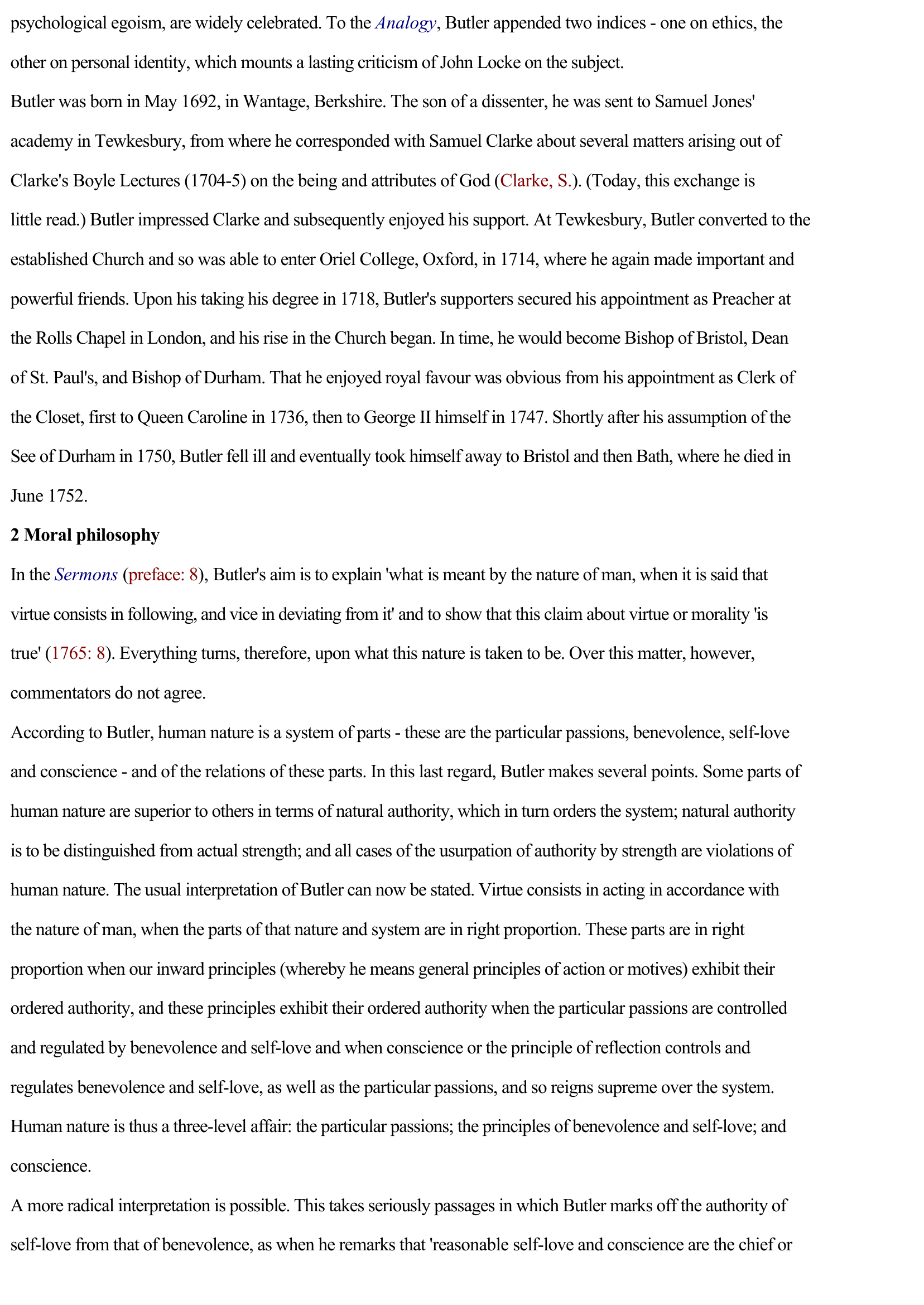Butler, Joseph
Publié le 22/02/2012

Extrait du document
«
psychological egoism, are widely celebrated.
To the Analogy , Butler appended two indices - one on ethics, the
other on personal identity, which mounts a lasting criticism of John Locke on the subject.
Butler was born in May 1692, in Wantage, Berkshire.
The son of a dissenter, he was sent to Samuel Jones'
academy in Tewkesbury, from where he corresponded with Samuel Clarke about several matters arising out of
Clarke's Boyle Lectures (1704-5) on the being and attributes of God ( Clarke, S. ).
(Today, this exchange is
little read.) Butler impressed Clarke and subsequently enjoyed his support.
At Tewkesbury, Butler converted to the
established Church and so was able to enter Oriel College, Oxford, in 1714, where he again made important and
powerful friends.
Upon his taking his degree in 1718, Butler's supporters secured his appointment as Preacher at
the Rolls Chapel in London, and his rise in the Church began.
In time, he would become Bishop of Bristol, Dean
of St.
Paul's , and Bishop of Durham.
That he enjoyed royal favour was obvious from his appointment as Clerk of
the Closet, first to Queen Caroline in 1736, then to George II himself in 1747.
Shortly after his assumption of the
See of Durham in 1750, Butler fell ill and eventually took himself away to Bristol and then Bath, where he died in
June 1752.
2 Moral philosophy
In the Sermons (preface: 8 ), Butler's aim is to explain 'what is meant by the nature of man, when it is said that
virtue consists in following, and vice in deviating from it' and to show that this claim about virtue or morality 'is
true' (1765: 8 ).
Everything turns, therefore, upon what this nature is taken to be.
Over this matter, however,
commentators do not agree.
According to Butler, human nature is a system of parts - these are the particular passions, benevolence, self-love
and conscience - and of the relations of these parts.
In this last regard, Butler makes several points.
Some parts of
human nature are superior to others in terms of natural authority, which in turn orders the system; natural authority
is to be distinguished from actual strength; and all cases of the usurpation of authority by strength are violations of
human nature.
The usual interpretation of Butler can now be stated.
Virtue consists in acting in accordance with
the nature of man, when the parts of that nature and system are in right proportion.
These parts are in right
proportion when our inward principles (whereby he means general principles of action or motives) exhibit their
ordered authority, and these principles exhibit their ordered authority when the particular passions are controlled
and regulated by benevolence and self-love and when conscience or the principle of reflection controls and
regulates benevolence and self-love, as well as the particular passions, and so reigns supreme over the system.
Human nature is thus a three-level affair: the particular passions; the principles of benevolence and self-love; and
conscience.
A more radical interpretation is possible.
This takes seriously passages in which Butler marks off the authority of
self-love from that of benevolence, as when he remarks that 'reasonable self-love and conscience are the chief or.
»
↓↓↓ APERÇU DU DOCUMENT ↓↓↓
Liens utiles
- ANALOGIE DE LA RELIGION NATURELLE ET RÉVÉLÉE, Joseph Butler
- Antoine Jay, la Conversion d'un romantique, manuscrit de « Joseph Delorme »
- VIE, POÉSIES ET PENSÉES DE JOSEPH DELORME Charles-Augustin : Fiche de lecture
- LION (Le) de JOSEPH KESSEL (résumé)
- ARTAUD Antoine Marie-Joseph, dit Antonin : sa vie et son oeuvre - Le Théâtre et son double

































